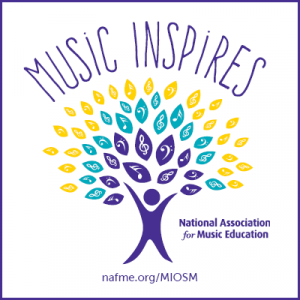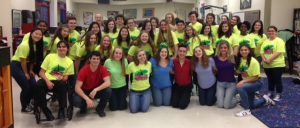We are very proud of all of the accolades that our musicians and vocalists garner each year as part of our school’s affiliation with various school music organizations: NAMM, RCMEA, NYSSMA, etc… Our students represent us well at all of the music festivals and competitions including All-County and All-State. It takes great dedication and self-discipline to perform at these levels of mastery and our music educators play a vital role in helping our students achieve these goals. Beyond this, the community is fortunate to be part of the audience throughout the year at our many seasonal concert events. This is an opportunity to witness our students working collaboratively, “in-concert.” Daniel Pink, in his book, A Whole New Mind, categorizes a person’s ability to work collaboratively in a “high-touch,” right-brained manner along six essential dimensions (Pink, 2005):
- Design – Moving beyond function to engage the senses.
- Story – Narrative added to products and services.
- Symphony – Adding invention and big picture thinking.
- Empathy – Going beyond logic and engaging emotions and intuition.
- Play – Bringing humor and light-heartedness to businesses and products.
- Meaning – the purpose is the journey and intrinsically providing meaning to life.
Consistent with Mr. Pink’s assertion that “right-brainers” will rule the world in this century, there is a strong rationale to ensure that music education continues to be viable in our schools. I wrote in detail about this in my blog post June 10, 2016. There is ample evidence to support strengthening the already great work that is happening in all of our schools concerning music education. This past week, I was part of the audience at the high school spring concert (I speak for the entire community when I say that it was amazing and I was thoroughly entertained). This year, the high school Concert Choir did a Gloria Estefan medley from “On Your Feet” where the kids had the opportunity to work with Broadway performer and choreographer, Robbie Roby. Next June, our choir students have been invited to sing in Paris, which is yet another example of the countless array of benefits provided to our students involved in music education.
After we’ve considered all the benefits of offering music education in our schools, I’m still left with one important question: What if the sole benefit of providing music education was simply for the sake of making our students more musical? I know that this may sound overly simplistic, but I believe that the value of music education goes far beyond how it may (or may not) influence other aspects of student-life. We make many impressive arguments about supporting music education as an adjunct to our kids’ education but I would like to advocate from the perspective of “music for music’s sake.” Dr. Eric Rasmussen, chair of the Early Childhood Music Department at the Peabody Preparatory of The Johns Hopkins University, writes:
“There is a massive benefit from being musical that we don’t understand, but it’s individual. Music is for music’s sake. The benefit of music education for me is about being musical. It gives you a better understanding of yourself. The horizons are higher when you are involved in music. Your understanding of art and the world, and how you can think and express yourself, are enhanced (Rasmussen in Brown, 2014).” While some of our students may pursue careers in a music field, the overwhelming majority of our children participate in music education in order to become more musical, “to appreciate all aspects of music, and to respect the process of learning an instrument or learning to sing, which is valuable on its own merit (Rasmussen in Brown, 2014).”
There was a time, not so long ago, when I may have “encouraged” my own children to practice more at their musical instruments under the assumption that they may score better on a NYSSMA solo piece or be accepted into a particular musical performance ensemble in school. Subliminally, I thought that these pursuits might also help them associate with similarly-minded students (and families) who held schooling and academic achievement in high regard. There was an odd prequel to this: When they were in utero, my spouse and I ensured that J.S. Bach’s “Air on the G String” was playing perpetually in the background and when they were born, we purchased the Baby Mozart videos. I chuckle about that now and maybe we, as parents, weren’t too far off. While there are scientific claims that certain types of music help babies’ neurons knit together differently, we were operating under the premise that “it couldn’t hurt” plus it made us all “feel good” (the latter benefit of “feeling good” being the most important benefit of being a musical family). Our kids are older now and we don’t encourage them to practice their instruments anymore. While I still love seeing/hearing them perform in their respective high school/college music ensembles, I admittedly feel greater satisfaction, as a dad, when I overhear the duo of my kids noodling Beatles’ tunes on ukuleles in the basement on a Friday night.
So, the next time you are driving down the road with your family, don’t be afraid to sing along with the music on the radio or sing a little louder during the course of your daily routine. We can all stand to be a little more musical in our lives.
Works cited
Pink, D. (2005). A Whole New Mind: Why Right Brainers will Rule the Future. Riverhead Books.
Rasmussen, E. (2014) was interviewed by Laura Lewis Brown in the pbs.org article “The Benefits of Music Education” at: http://www.pbs.org/parents/education/music-arts/the-benefits-of-music-education/

